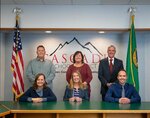

Cascade School District (CSD) Superintendent Tracey Beckendorf-Edou is a semester away from completing her fourth year on the job. The CSD Board is well established, with most members having already served more than one term. Given that tenure, the performance, and direction of CSD is now fully in the hands of Beckendorf-Edou and the Board. Two of those performance metrics are the state of the implementation of CSD’s Strategic Framework 2020-2025 (the Framework) and the CSD Improvement Plan 2022-2023 (the Plan), both of which, in January 2023, are at their mid-term points.
Building from a foundation of CSD’s mission statement - “Continuous Student Development” - and vision - helping “students develop character, scholarship and determination” - the Framework’s goal is to define CSD as an institution that “cultivate[s its students’] full potential for lifelong success . . . guided by the knowledge that when we grow individuals, we grow strong, vibrant communities and a more connected world.” The Plan’s objective is to “orient district-wide priorities and initiatives PreK -12" by means of achieving four main goals during the current school year.
At the start of the 2019-2020 school year, Beckendorf-Edou embarked on what she called a “listening tour” of CSD by asking school board members, staff, students, parents, and community members for their vision of, and priorities for, the direction of CSD, as a whole. The feedback she received was then distilled and developed into the core tenets of what became the single-page Framework, which the Board approved and adopted in July 2020. The Framework was then presented and disseminated to the wider CSD community via presentations, newspaper accounts, social media, and a website.
The Plan, with goals that align to the vision set forth in the Framework, was developed and issued by Beckendorf-Edou and advisors in the summer of 2022. It both fleshed out the visions of the Framework and reported data from the 2020-2021 school year as a means of providing a progress report, of sorts, on the Framework.
The first goal of the Plan, which orients with the Framework’s first vision, is to “improve academic and postsecondary success,” specifically by ensuring that students are “on track” by ninth grade, “have postsecondary opportunities while in high school,” and have high, “on-time graduation” rates.
To help achieve those ends, one of CSD’s primary focal points is the implementation, in grades 3 -12, of a program called Advancement via Individual Determination (AVID), which “serves not only [potential] first-generation college students through electives at the secondary level, [but] also provides [district-wide] emphasis on having a postsecondary culture, focus on rigorous instruction, and creating systems to support student learning and growth.” CSD plans to further develop AVID certified sites at Alpine Lakes Elementary School (ALPS), Icicle River Middle School (IRMS), and Cascade High School (CHS). In addition, Peshastin-Dryden Elementary School (PD) will undergo a planning year in 2022-2023, with AVID implementation to follow in 2023-2024.
According to the CSD website, “AVID has a great success rate in improving college-going rates of students across the country and helps students learn skills such as taking notes, asking good questions, and organizational skills.” ALPS Principal, Kenny Renner-Singer is CSD’s AVID Director and reports that “we [currently] start [the program] in the third grade with school-wide AVID and then move to an electives program at the middle and high school. We talk about career and college readiness with a focus on note taking, vocabulary development, academic achievement, and more.”
Other initiatives underway for reaching the first goal of the Plan include: working to “continuously improve students’ proficiency on the ‘Smarter Balanced English and Math’ assessments” starting in third grade, and the state science assessment at applicable grade levels; working to ensure that students with “Individual Education Plans and English Learners” meet or exceed state percent proficiency on the Smarter Balanced Assessment; providing, at CHS, Career and Technical Education Dual Credit, Advanced Placement, and industry certifications, together with other career-relevant experiences, apprenticeships, and job shadows.
In furtherance of those latter objectives, CHS and CSD have partnered with the Chelan County Fire District, the Wenatchee River Institute (WRI), Wenatchee Valley College, the Leavenworth Fish Hatchery, and Upper Valley MEND, among others. “The objective is that at least 95% of Cascade graduates will experience a postsecondary opportunity while in high school.”
The data provided in the Plan shows improvement from the 2020-2021 to the 2021-2022 school year in “ninth grade on track” and postsecondary opportunities, with a small dip in the CHS graduation rate (from 91.4% to 90%). Proficiencies in English and Math across CSD are more of a mixed bag. Students in the district, on average, generally scored above the state average. Yet, while improvement in English proficiency is on a generally upward, linear path throughout CSD, from the third grade through high school, the same cannot be said for proficiencies in math, which tend to fall in a similar, albeit steeper linear pattern. (Of note, data show similar drops in math proficiencies statewide as students’ progress from grades 3-12.)
Goal number two of the Plan, in correlation with the Framework's vision of “engaging students in outdoor learning,” is “to promote outdoor learning.” Beginning with the 2021-2022 school year, all CSD teachers were given the opportunity to receive training in, so-called, FieldSTEM, which is the incorporation of “outdoor, place-based experiences for students connected to district curriculum.” This training will continue into the 2022-2023 school year. CSD is also seeking grants to create outdoor classrooms on each of its campuses.
As per the Plan, “[s]tudents in every grade level will have the opportunity to participate in at least one integrated, career connected, locally relevant, field-based or project-based learning experience in the school year. [CSD] will build outdoor classrooms at every campus, PreK - grade 12, as well as a greenhouse that will be accessible to students in grades 3 -12.” In addition, CSD will build and maintain community partnerships in furtherance of those goals with, among others, WRI, Cascadia Conservation District, Waste Loop, the Methow Arts Alliance (Methow Arts), Chelan County Natural Resources, Washington Department of Ecology, and MEND.
While outdoor classrooms and the greenhouse are yet to come, the Plan reports that in the 2020-2021 school year, 100% of students at PD and ALPS, and 67% of students at IRMS, had “at least one field-based or project-based learning experience.” At CHS, high school teacher Eric Bard’s Natural Resources class was the only curricula available. Yet, community partnerships across the district were plentiful.
“A fun area of challenge for us is outdoor learning, because we are going to have a brand-new outdoor classroom, which we can’t wait to install,” announced PD Principal, Emily Ross. Ross continued: “At this level, every single teacher plans to utilize the outdoor classroom once it’s installed. The teachers will make sure to sign up for this place. Until then, they go down to the future location and just use nature.”
Part 2 will be continued in the Feb.15, 2023 issue.
Comments
No comments on this item Please log in to comment by clicking here